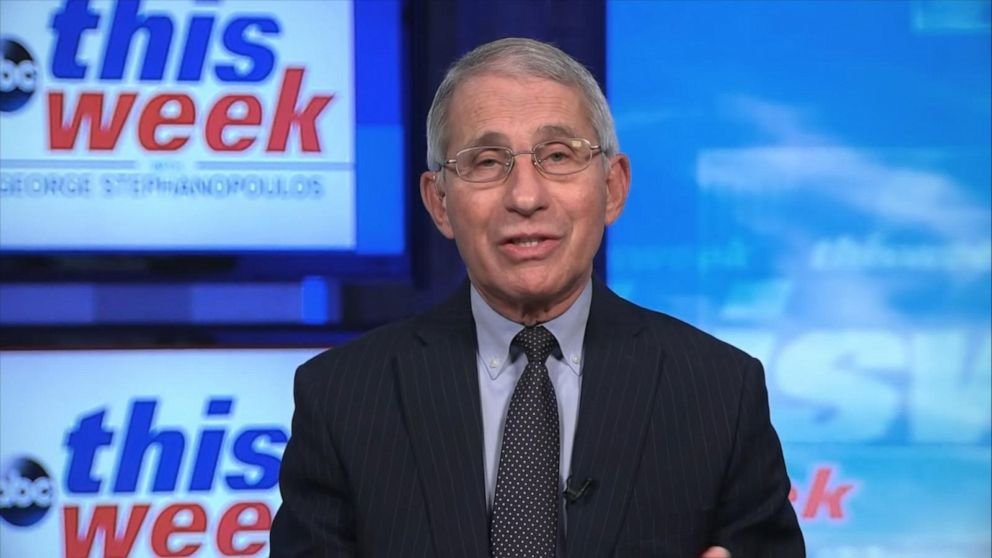Fauci tells ABC News: U.S. may see ‘surge upon surge’ of virus in weeks ahead due to Thanksgiving travel

NEW: “We may see a surge upon a surge. We don’t want to frighten people but that’s just the reality,” Dr. Anthony Fauci tells @MarthaRaddatz, adding that he doesn't expect a relaxation of restrictions or travel advisories for the Christmas season. https://t.co/txCs2tyc80 pic.twitter.com/ajTlQoMzpK
— This Week (@ThisWeekABC) November 29, 2020
WASHINGTON, DC -- The nation’s top infectious disease expert said Sunday that the U.S. may see “surge upon a surge” of the coronavirus over the coming weeks due to Thanksgiving gatherings and travel, and he does not expect current recommendations around social distancing to be relaxed before Christmas.
“When you have the kind of inflection that we have, it doesn’t all of a sudden turn around like that,” Dr. Anthony Fauci, director of the National Institute of Allergy and Infectious Diseases, told ABC’s “This Week.” “So clearly in the next few weeks, we’re going to have the same sort of thing. And perhaps even two or three weeks down the line ... we may see a surge upon a surge.”
He added: "We don't want to frighten people, but that's just the reality."
Despite the Centers for Disease Control and Prevention's encouragement that Americans postponed travel and stay home for Thanksgiving, the Transportation Security Administration screened more than 8 million people between Nov. 20 and Saturday. As of Sunday morning, November U.S. coronavirus cases surpassed 4 million, doubling October's previous monthly high. Over 266,000 Americans have died from Covid-19 since the pandemic began.
"We said that these things would happen, as we got into the cold weather and as we began traveling, and they've happened. It's going to happen again." Fauci said on "This Week." "So I cannot see, all of a sudden, a relaxation of the kinds of recommendations or restrictions because we're getting into colder weather, and in -- in an even larger holiday season as people travel to come back and forth for Christmas."
Given the increasing number of cases, Fauci urged Americans Sunday to be "really careful" as they return from Thanksgiving holiday travel. He said it’s “not too late” for people traveling back home to help stop the spread of the virus by wearing masks and staying distant from others. He also encouraged quarantines and testing.
"If they've been in situations outside of the family setting, in which they really don't know the level of exposure … you've really got to understand the importance of trying to prevent further spread and further surge," he said.
Since January, when the first infections were reported in the U.S., the nation’s total number of cases has surpassed 13 million and more than 265,000 people have died. According to data from John Hopkins University, there's been an increase of more than one million cases in just the last six days.
Despite the dire data however, Fauci encouraged optimism about the end of the pandemic, saying the arrival of vaccines offers a “light at the end of the tunnel.” This coming week, the Advisory Committee on Immunization Practices will meet with the Centers for Disease Control and Prevention to discuss a rollout of the vaccine, he explained.
"Vaccines are really right on the horizon. We'll be having vaccines available for the higher-priority people towards the middle and end of December and as we get into January and February," he said, echoing forecasts from the government's immunization initiative leaders.
He added that President-elect Joe Biden should focus on distributing vaccines in an “efficient and equitable way.” Fauci also said he planned to push the new administration for a rigorous testing program.
“We’ve got to go beyond the symptomatic people and get a better understanding of the asymptomatic transmission,” he said.
Health care workers will likely be among the first to get the vaccine, and soon.
“We likely, almost certainly, are going to be vaccinating a portion of the individuals in the first priority before the end of December, and then as we get into January and February and March, more and more,” Fauci said, while still encouraging social distancing, mask wearing and hand washing, among other interim steps to combat the virus.
“So if we can hang together as a country and do these kinds of things to blunt these surges until we get a substantial proportion of the population vaccinated, we can get through this,” he maintained.
The public's willingness to receive that vaccine has been a focus of public health experts in recent weeks, even as pharmaceutical companies like Moderna and Pfizer announce promising test results. Recent polls show as many as two out of five Americans would not agree to be vaccinated against Covid-19.
On "This Week," Fauci noted that while the government cannot mandate a vaccine, "any individual group," such as businesses and schools could require its receipt, using his employer, the NIH, and its vaccine requirements for employees as an example. He further encouraged the government to engage with local leaders to assist in combating anti-vaccine mindsets and affirm the inoculation's safety.
"We've got to be able to get out there, get community people -- who the community trusts -- to show two things: The process of the development of this vaccine has been one that has been scientifically sound, safety has not been compromised, scientific integrity has not been compromised. And the process of determining whether it works, whether it's safe and effective has been independent, by independent bodies and transparent," Fauci said.
As of Saturday, coronavirus hospitalizations were increasing in 46 states, Washington, D.C. and Puerto Rico and 13 states hit a record number of new cases, 26 states hit a record number of current hospitalizations and 12 states hit a record number of new deaths in the past week.

